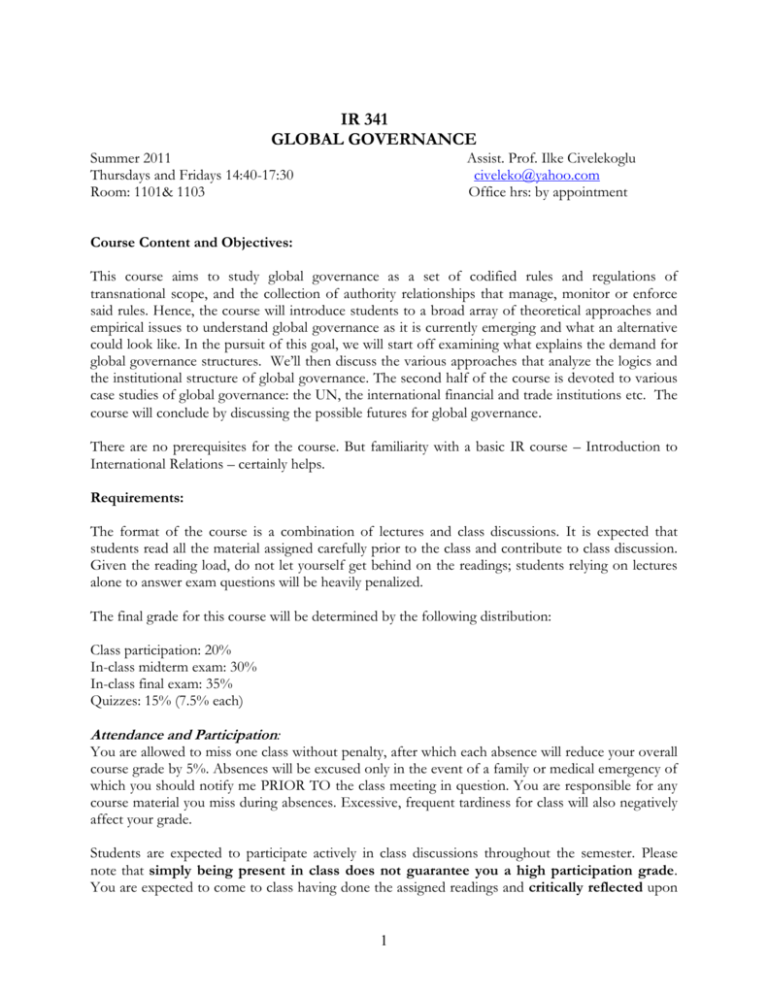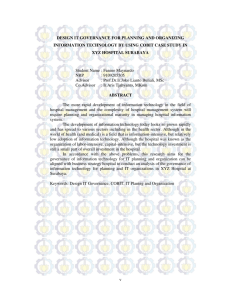
IR 341
GLOBAL GOVERNANCE
Summer 2011
Thursdays and Fridays 14:40-17:30
Room: 1101& 1103
Assist. Prof. Ilke Civelekoglu
civeleko@yahoo.com
Office hrs: by appointment
Course Content and Objectives:
This course aims to study global governance as a set of codified rules and regulations of
transnational scope, and the collection of authority relationships that manage, monitor or enforce
said rules. Hence, the course will introduce students to a broad array of theoretical approaches and
empirical issues to understand global governance as it is currently emerging and what an alternative
could look like. In the pursuit of this goal, we will start off examining what explains the demand for
global governance structures. We’ll then discuss the various approaches that analyze the logics and
the institutional structure of global governance. The second half of the course is devoted to various
case studies of global governance: the UN, the international financial and trade institutions etc. The
course will conclude by discussing the possible futures for global governance.
There are no prerequisites for the course. But familiarity with a basic IR course – Introduction to
International Relations – certainly helps.
Requirements:
The format of the course is a combination of lectures and class discussions. It is expected that
students read all the material assigned carefully prior to the class and contribute to class discussion.
Given the reading load, do not let yourself get behind on the readings; students relying on lectures
alone to answer exam questions will be heavily penalized.
The final grade for this course will be determined by the following distribution:
Class participation: 20%
In-class midterm exam: 30%
In-class final exam: 35%
Quizzes: 15% (7.5% each)
Attendance and Participation:
You are allowed to miss one class without penalty, after which each absence will reduce your overall
course grade by 5%. Absences will be excused only in the event of a family or medical emergency of
which you should notify me PRIOR TO the class meeting in question. You are responsible for any
course material you miss during absences. Excessive, frequent tardiness for class will also negatively
affect your grade.
Students are expected to participate actively in class discussions throughout the semester. Please
note that simply being present in class does not guarantee you a high participation grade.
You are expected to come to class having done the assigned readings and critically reflected upon
1
them. During discussion, you should show a basic understanding of the main arguments of each
reading as well as offer your own ideas with respect to whether you agree with the authors’
viewpoints. If certain individuals are not actively engaged in discussion, it is possible that I call on
those individuals to reflect, respond or offer input. In all our discussions, students are expected to
defend whatever you say with specific references to the assigned readings. Also, in order to ensure a
rich learning environment, students are expected to respect the opinions of other students and to
engage in discussion and debates in a sensitive and respectful manner.
Written Examinations: All students must take exams and quizzes at the scheduled times so as not
to lose the corresponding portion of the grade. No excuse for absence in examinations will be
accepted, except for medical reasons documented by a physician.
July 21, August 12: Quizzes
July 28: In-class Midterm Exam
August 19: In-class Final Exam
Appropriate Classroom Behavior: Students are expected to show respect for the professor and
other students. This means arriving a few minutes prior to the start of class, so that lectures and
sections can begin on time without disruption; refraining from distracting behaviors during lectures
and sections (using email, surfing the internet on your laptop; sending text messages from your cell
phone; reading anything not related to the course; writing notes or talking to one another and
daydreaming in class); and generally paying attention to what’s being said in class. Any behavior that
would be inappropriate while watching a live performance (arriving after the first act has started,
leaving your cell phone on; talking during the performance) is inappropriate for lecture.
**Students who act inappropriately in class will be asked to leave.
Academic Honesty: Cheating will result in a failing grade for the course and administrative action.
Course Material: Available as package at the Canon copy shop.
SCHEDULE
I- What is Global Governance? What are the Key Challenges It Faces?
July 7: Introduction
*Karns and Mingst, “The Challenges of Global Governance”, in Margaret P. Karns and Karen A.
Mingst (eds.), International Organizations: The Politics and Processes of Global Governance, Boulder: Lynne
Rienner Publishers, 2004), p.3-34.
2
II- Theoretical Approaches to Understanding Power and Authority in Global Governance
July 8, 14: Conventional Approaches: Realism, Neoliberal Institutionalism and Marxism
*Mearsheimer, John “The False Promise of International Institutions”, International Security 19 (3),
Winter 1994/95, p. 5-49 (read only p. 5-37).
*Keohane, Robert and Lisa Martin. “The Promise of Institutionalist Theory” International Security 20
(1), (Summer 1995), p. 39-51.
*Keohane, Robert O. “International Institutions: Can Interdependence Work?” Foreign Policy 110,
(Spring 1998), p. 82-98.
*Lenin, V.I. Selections from Imperialism: Highest Stage of Capitalism (New York: International Publishers,
1939), p.110-119.
July 15: Sociological Approaches: Constructivism
*Mearsheimer, John “The False Promise of International Institutions”, International Security 19 (3)
(Winter 1994/95), p. 37-47.
*Wendt, Alexander “Anarchy is What States Make of it”, in Art and Jervis (eds.), International Politics:
Enduring Concepts and Contemporary Issues, 7th edition (New York: Pearson/Longman, 2005), p. 61-68.
*Gheciu, Alexandra “Security Institutions as Agents of Socialization? NATO and the ‘New
Europe’”, International Organization 59 (Fall 2005), p. 973-1012 (read only p. 973-1003).
III- Governing Security and Military Operations in Global World
July 21: The United Nations and Collective Security
*************************Quiz at the beginning of class on July 21*******************
*Pease, Kelly, ch5, “International Security” in her book International Organizations, Perspectives on
Governance in the Twenty-First Century, Third Edition (New Jersey: Pearson Prentice Hall, 2008), p. 103127, skip 118-122.
*UN Charter, Chapter VII, available at: http://www.un.org/aboutun/charter/index.html
*UN Resolution 1441.
*Glennon, Michael “Why the Security Council Failed”, Foreign Affairs 82 (3) (May-June 2003).
3
July 22: Peacekeeping and Humanitarian Intervention
*Karns, P. Margaret and Mingst, A. Karen “Peacekeeping”, in Karns and Mingst (eds.), International
Organizations. The Politics and Processes of Global Governance, (Boulder: Lynne Rienner Publishers, 2004),
p. 306-327.
*“Convention on the Prevention and Punishment of the Crime of Genocide”, available at:
http://www.unhchr.ch/html/menu3/b/p_genoci.htm
*Report of the International Commission on Intervention and State Sovereignty, “The
Responsibility to Protect”, p. XI-XIII, 11-13, and 29-37.
*Straus, Scott “Darfur and the Genocide Debate”, Foreign Affairs 84 (1) (January-February 2005).
July 28: Midterm
IV- Challenge of Governing Monetary System in Fragile Global Economy
July 29: Bretton Woods System and Beyond
*Helleiner, Eric “The Evolution of the International Monetary and Financial System” in J. Ravenhill
(ed.), Global Political Economy (London: Oxford University Press, 2004), pp.151-176.
August 4: The IMF and Its Critics
*Stiglitz, Joseph Globalization and Its Discontents, (London: W. W. Norton & Company, 2002), ch.4.
*Bird, Graham “IMF Programs: Do They Work? Can They Be Made to Work Better?” World
Development 29(1), 1999, pp.1849-65.
*Rogoff, Kenneth “The IMF Strikes Back”, Foreign Policy 134 (January 2003), p.38-46.
V- Understanding World Trade System and Its Challenges
August 5: The WTO and International Trade
*Mortensen, J. “The WTO and the Governance of Globalization: Dismantling the Compromise of
Embedded Liberalism?” in G. Underhill (ed.) Political Economy and the Changing Global Order, (London:
Oxford University Press 2004), pp.170-183.
*Oatley, Thomas International Political Economy: Interests and Institutions in the Global Economy
(New York: Pearson, 2006), p.17-35.
4
V- Current Issues in Global Governance
August 11: The Environment
**********************Quiz at the beginning of class on August 11*******************
We will watch and discuss the movie, “An Inconvenient Truth”
* Pease, chapter 9, “The Environment”, p. 225-252.
August 12: Challenges For the Future: Confronting Problems of Legitimacy, Accountability
and Effectiveness in Globalizing World
*Karns and Mingst, “Dilemmas of Global Governance in the Twenty-First Century”, p. 510-520.
*Pease, ch.11, “Global Governance in 2025”, p. 285-297.
*Gore, Charles “The Rise and Fall of the Washington Consensus as a Paradigm for Developing
Countries”, World Development 28(5), 2000, pp.789-804.
August 18: Review for the Final
*************************August 19: Final Exam********************************
5









